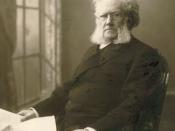Norwegian playwright Henrik Ibsen was born at a time when social and political injustice were either avoided or ignored. During the 1870's, the Realism movement which attempts to reflect social problems of 19th and 20th century, spread towards Norway. Inspired by conventions of realism, Ibsen developed his realist plays to support these growing realist ideas. All his important plays (A Doll's House, Ghost, Pillars of Society, Hedda Gabler) voiced Ibsen's attempts to allow the audience and people of the time to seriously question the inequality between genders and discrimination of basic human rights.
Realism dismisses previous Melodrama and Romanticism ideals of theatre performances where stereotypical upper-class men follow a typical storyline that ends in the happily-ever-after routine. At the time, the rapid evolvement of science created a technical atmosphere. Charles Darwin and his theory of evolution showed that humans are just like any other animal. Karl Marx and other social theorist challenged the significance of society's influence over human's behaviour.
Thus, rather than watching clichés repeatedly on stage, more emphasis was placed on mirroring reality in a more factual, scientific and critical way. Based on these scientific and psychological discoveries, realism explores those problems that exist within any society that tended to be avoided at the time. The problems Realist Theatre achieves to reflect on stage lies on people like Henrik Ibsen's strong social and political beliefs at the time. Ibsen's inspiration of the conventions of Realist Theatre originated from his poverty at early youth. He suffered greatly dealing with the harshness of conditions of working-class life and endured social disadvantages that he despised. Ibsen later revived this experience and used it to allegorise in The Wild Duck. Divorce, unhappiness, diseases, the role of women, depression and social problems are common themes in Ibsen's plays.
The role of women...



Nice Work!
This is excellent! This essay makes me a proud Norwegian! This is just great! Henrik Ibsen is the greatest Norwegian that has ever lived!
1 out of 1 people found this comment useful.